Rogaia Abusharaf, a professor of anthropology at Georgetown University Qatar, talks with host Aloysius Ordu about the leading role Sudanese women have played in movements for peace and justice from the early 1920s to the recent Sudanese revolution (2018-19). Dr. Abusharaf also describes her research on African migrations and the Intersectionality of race, gender, and politics.
- Subscribe and listen to Foresight Africa on Apple, Spotify, and wherever you listen to podcasts.
- Learn about other Brookings podcasts from the Brookings Podcast Network.
- Sign up for the podcasts newsletter for occasional updates on featured episodes and new shows.
- Send feedback email to [email protected].
TRANSCRIPT
[music]
ORDU: I’m Aloysius Uche Ordu, director of the Africa Growth Initiative at the Brookings Institution, and this is Foresight Africa podcast.
Since 2011, the Africa Growth Initiative at Brookings has published a high profile report on the key events and trends likely to shape affairs in Africa in the year ahead. Entitled “Foresight Africa,” the goal of the publication is to bring attention to these burning issues and to support policy actions to address them.
This is season two of the Foresight Africa podcast in which I engage with the report authors, as well as policymakers, industry leaders, Africa’s youths, and other key figures. Learn more on our website, Brookings dot edu slash Foresight Africa Podcast.
My guest today is Rogaia Abusharaf. Rogaia is a professor of anthropology at Georgetown University in Qatar. She writes on culture and politics, anthropology of gender, human rights, migration, and diaspora issues in Sudan, the Gulf, Oman, Zanzibar, and the Indian Ocean countries.
Rogaia, indeed, is a prolific author, and she wrote a brilliant piece for us in “Foresight Africa 2022.” And that piece was titled “The Women of Sudan Will Not Accept Setbacks.” In today’s podcast, Rogaia and I will discuss that essay and her other scholarly work.
Rogaia, a warm welcome to our podcast.
ABUSHARAF: Thank you so much. It is an absolute honor, Dr. Ordu, for this wonderful opportunity.
ORDU: So, first, Rogaia, for the benefit of the young women and girls across our continent, in Africa and elsewhere listening to this podcast today, could you tell us about your journey thus far? How did a young lady from Sudan end up as professor of anthropology at Georgetown University in Qatar?
ABUSHARAF: Thank you so much. This is an excellent question, and I really hope that our daughters and young sisters who are listening to this podcast would take it as a lesson that they can, provided all the support needed for them to succeed.
I have always been fascinated by the study of human societies. Growing up in the Sudan of the ‘70s and ‘80s, we used to have an excellent education system where we were exposed at a very early age to geography, history, poetry, rhetoric even, as young people. Or geography lessons and history, although at that point seemed daunting and boring, came to our aid as we moved forward.
When I graduated from college from Cairo University School of Economics and Political Sciences, I got a job at Sudan Development Corporation, which was one of the biggest corporations at that time, founded by His Excellency Mohammad Abdel Madjid Rhaman, had a vision for the country, had a vision for what local talents can bring to bear in the discussions about development and the Sudan and its role in it.
So, I was hired immediately, two months after my graduation to work as a junior information officer, and that meant that I have to read every item published on questions of international development, of development debates in Africa, to gather information, read the newspapers, the articles, everything, and start to publish. We called it the “SDC Newsletter,” which was published in Arabic, English, and French, and we sent it to our donors and to our clients working in the region, in Eastern Africa in particular.
The fact that I was given the opportunity as a junior officer at SDC meant that I had to do a lot of household interviews, to accompany international teams to different projects and different places. Took me around Khartoum and outside of Khartoum to talk to people about responses, how they view themselves, how they see themselves consuming some of the materials that were presented to us.
One of the important projects—and I owe a lot to my interest in pursuing anthropology—was when a Swedish company came to Sudan Development Corporation to help with promoting soymilk. I remember the vanilla, strawberry, and chocolate flavors to this day. And so we went throughout the country with samples. We left the samples and came back and talked to people of all different kinds of backgrounds. You know, within our African households you have multigenerational families where you can talk to the children, the parents, and grandparents, and so on about actually their feelings about this seemingly alien drink.
When I came back to my office to try to compile a report and write about it, I remember I did it in my handwriting before I went because I was just so immersed and so fascinated. That gave me the opportunity just to reflect even deeper to the kind of anthropology that I was taught at Cairo University, coupled with my training as SDC, and especially African anthropology, where we had professors who studied African anthropology in college and created this world. They just … the way that they talked about it, the way that they rendered the information, you feel that you are in a street in one of the African countries. Definitely Sudan, I just felt pretty much at home with the subjects.
And so, coupled with that kind of training made me intent on pursuing anthropology.
ORDU: That’s quite an auspicious beginning that laid the foundation to your interest, dedication, and commitment to anthropology. So, Rogaia, let’s now turn to your essay in “Foresight 2022.” You wrote about the momentous role that women played in ousting the dictator Omar al-Bashir in Sudan. Could you tell us more about the extraordinary role that these women played throughout the uprising in Sudan?
ABUSHARAF: There is no doubt that Sudanese women are some of the most politically active segment of the population. The years of Omar al-Bashir witnessed a huge decline at every level imaginable. At the level of education, at the level of employment. I mean, it was based, again on political affiliation. The greatest swathes of Sudanese women who are not politically organized, were left to fend for themselves. They have a lot of issues that encountered during al-Bashir’s regime.
But as I said, in terms of the protests, in terms of joining the protests that lasted for months, you have to see the amount of revolutionary energy that they brought to bear. Twenty-four hour protests in front of the Army Center Command. And that took, of course, tremendous courage and fortitude for these young people. And I would stress again, the young people, although I want to acknowledge that older people beyond college students years were also present. There was again a strong presence of people from all different kinds of socioeconomic backgrounds and age and so on.
But particularly a certain group, a strata of young women showed the courage. They became emblems. I mean, there was that image of the kandaka, the queen, okay, the fighting queen, the brave queen that they drew from. So, they drew from a wealth of political activism that goes back centuries.
So, they were, of course, driven as citizens of the Sudan who see the decline of the country and as also individuals who suffer in particular ways as women, as curtailing of their freedom of movement. We have seen in social media an image after an image of somebody being beaten in public or being apprehended for not wearing this or wearing that.
So, it was really important for them. The stakes were extremely high. So, they were driven by duties of citizenship, by duties of being accountable to others who are not able actually to make their voices heard because of any particular constraint. And they continued.
And I think that for this reason, we have seen tremendous focus on the role of these young Sudanese women in the revolution. And they continue, the protests continue to this day, and we see that there is no amount of violence that is capable of mitigating or even constraining them in continuing to take an active role.
ORDU: Rogaia, in your piece you also alluded to the fact that women’s agitation is not new. Indeed, that even under British colonial rule during, I guess, 1898 to Sudanese independence in 1956 or so, Sudanese women have been at the forefront in the fight for gender equity. What were the notable achievements, in your view, of these women in colonial times?
ABUSHARAF: Again, the very important and critical role that the women of the Sudanese Women’s Union played. But before that, of the less-documented cases, we have the national brave leader, Ali Abdullatif of the 1924 uprising against the British. His wife, Hajjah Alhaza, was one of the very first people to lead a demonstration against the British. Here we are talking about 1920s. And we salute Alhaza for what she represented and what she embodied at that point.
The Sudanese Women Union started with an idea over tea by the late Dr. Khalda Zahir Al-Sadati and her friend also the late Fatima Talib. And I had the good fortune of speaking to Dr. Khalda Zahir about what was the thought process. Khalda Zahir was the first Sudanese woman to attend medical school. At that point it was Kitchener Memorial College. So, she started to talk to me about it. My friend was over and we talked about the situation of the British. We knew, of course, about the graduate conference and the agitation for independence and so on. But we also felt that as Sudanese women who are politically aware of the colonial condition, that we needed to do something, we needed to do something at the level of organization. We also realized that it was very important to build alliances to support the union.
So, what happened is with that seed of the idea, they incorporated more people, they invited more friends, and they started the schoolteachers and other people who are not organized or are not employed. And that is what I appreciated about the reach. That talent does not just exist among people who went to school. So, they were very inclusive, very diverse and very inclusive.
Later on, in 1952, when the late Fatima Ahmed Ibrahim, who became the leader of the Sudanese Union, the Sudanese Women Union, and much later on became the first African woman to become the president of the International Federation of Women. Agitated, they started the magazine, Sawat al-Maraa—The Woman’s Voice. The biggest achievement through this publication and alliances and such a concerted effort, they were able to pressure for equal pay for equal work. Here we are talking about the early ‘50s. We are talking about people who managed to do that even under the British before independence in 1956. They tried to look at questions of family laws. Family law, of course, open to strict rules, just like the obedience, the law of obedience. So, there is something called “house of obedience,” where if a man doesn’t want to grant a woman a divorce, he can actually bring her. And here the house of obedience conjures the image of a physical house. It is a sort of imprisonment or internment until she comes back as an obedient wife. So, what happened is that it was abolished because of such agitation.
I would be remiss if I don’t mention to you some people who lied outside of this gathering I told you about between Dr. Khalda Zahir or Fatima Ahmed Ibrahim. But during the British also there are numerous groups of women who were very, very active. And they tried also to look at some of the so-called traditional practices. Some people would love to call them feminists, but I would say that they were far more inclusive than that. That they realized that it’s about society, it’s is not about targeting a certain group, while trying to advocate for women’s education. We have Malkadar Mohammad Abdullah, a teacher and a writer. Another one, Nafisa Abdel Karim, who traveled all over the country in the ‘40s. Here we are talking about two women in the ‘40s who traveled all over the Sudan under very difficult conditions to try to talk to women and men about ideas of public health, ideas of practices that are definitely detrimental to young people, and so on.
And one of the British writers who actually lived in the Sudan and taught in the Sudan by the name Ina Beasley talked about them to acknowledge the “lady propagandists.” That is what she called them. But in a way, in a way, these two women, although they didn’t live long enough to be part of this beautiful scene we are seeing unfolding in this theater of courage before our eyes, but still they sowed the seeds for that.
So, this is a long winded answer to your question about their achievements. So, I would say that the achievements, yes, equal pay, something that has only recently came into vogue in other places other than our Global South.
ORDU: Fascinating indeed. The whole notion that as far back as the ‘40s and ‘50s, these women were really undeterred and pushing for justice and equality. Rogaia, you wrote that despite the challenges to their struggle for gender equality and justice, the determination of Sudanese women to bring about a measure of fairness remains unshakable. These are your words. What is the current status of the women’s struggle in Sudan today?
ABUSHARAF: The current situation is part of the overall scene that we are seeing for the continued agitation for civilian, restoration of civilian rule in the country, agitation for accountability. The idea that you have to realize that without accountability there is no justice. And so that is, again, part of the struggle that continues today as we see in the overall protests in the country that happens almost every day, organized by different groups and so on. But they are coming together under the banner of a civilian Sudan, a democratic Sudan, a Sudan that would promise and would bring about a measure of fairness.
Of course, we are not naive to think that justice can just happen like that without an infrastructure, without an institutional framework that helps people understand that human rights are paramount and women’s rights are part of being the recognition, the recognition that they play a very important role.
Right now, when you look at the composition of the government, you are going to say, okay, I notice that there are a lot of women who are put in different ministries or have been since the prime minister, Abdalla Hamdok.
But we are coming back here to the question of political allies and we are talking here about class. But this is an anomalous situation. The overwhelming majority of people seek justice and they seek holding people accountable, people who committed incredible abuses of power, so that people can start afresh. We all have to remember the lessons of the late Bishop Tutu, that there is no justice without people coming to terms, whatever that is, TRCs—truth and reconciliation—or some forum. People need to see that people who raped and maimed and killed and displaced are not getting scot free. So, that is part of the current situation for the struggle and in the struggle.
ORDU: Let’s now turn to your other publications. In 2021, you published the Darfur Allegory. What was the book about?
ABUSHARAF: This book brings me back to childhood memories. Long time ago in our school, primary school, it was called the Girls Training College. Around Eid time, Eid—the celebration of sacrifice—we had a gathering that our principal called for and said, okay, for anybody, if you can help with fighting thirst in western Sudan, and for that reason, we want you to donate the skin, the sheep skin once the animal is slaughtered. We lived in Omdurman, one of the three towns of the capital city. And indeed I described that as an entry into Darfur, and I described my own horror towards the killing of the sheep, and the skinning, and the skins piled on the back of the lorry that was collecting the sheepskins for that project.
So, I asked myself when I was thinking about Darfur and the continuum and the enduring issue, to ask myself, was that fear misplaced or was it indeed something that promised the horror that this region endured? We are talking about the scarcity and the politics of scarcity, and we have wonderful writings on that. I want to mention and give a shout to Alex de Waal, Famine That Kills.
So, I kept thinking about that continuation of problem, it’s a childhood memory that of course unnerved me in the sense that there is this sheep and you play with it and two days later it is dead. And so, it’s it is that fear. It is that stress. It is that aversion to meat that I developed.
But at the same time, years later, we also had the issue of the drought and the certification, and the efforts of our neighborhood living and other neighborhoods in the country to collect donations, to try to give it to the displaced people who just fled Darfur.
So, that continuum is what really made me look at Darfur and try to put it in some historical perspective as an enduring issue of political economy, ethnic identity, of the politicization of ethnicity and racial identity.
But what became clear to me, which I put it in terms of question marks, because the book came out after the revolution. But then after the revolution, you had segments of people who fought against the people of Darfur and some of the armed movement leaders who are now in the government of the Sudan.
So, see? See how class started to congeal before my very eyes? Because I did point out to that tension to say that, okay, yes, you had a certain discourse about race, about the genocide, but what about the people who actually raised arms in support, let’s say, of, okay, justice and equality for Darfur? But they happen to be now at the seat of the government—ministers of finance, all the while people are still displaced.
So, I wanted to show that allegory, to say that in the Sudan things are not black and white. And I am sure that so many people would agree with that. I’m not coming with something that is totally genius. I think that people would agree that this is a moment, this is a moment to pivot and try to think about racial politics, how it relates also to class formation, to authoritarianism, and to people vying for money and value. So, that was Darfur Allegory, started with that.
I started also to talk about the very idea of annexing an independent sultanate under the British, which was the Sultanate of Darfur, fiercely independent at that point. And that is again also becoming a cliché because it happened in so many African societies and African countries that we need to remember it once in a while when we talk about this.
ORDU: And earlier you had published a book titled Transforming Displaced Women in Sudan: Politics and the Body in a Squatter Settlement, in 2009. What was the central issue you sought to address in that book?
ABUSHARAF: Displacement and cultural change, displacement and different strategies for survival in a squatter settlement. Different ways of people-to-people diplomacy, if you will. Also, how poverty and displacement that brought people in a squatter settlement that happened to be from South Sudan. My major focus was South Sudan and South Sudanese women in Khartoum in the north. I witness relationships, followed their stories closely, and went to both South Sudan and different parts of the Sudan, where you have these squatter settlements. And how they negotiated, really, life as displaced people.
I met them frequently. I attended several things at the churches, Southern Sudanese churches, that also included other Sudanese Christians and Ethiopian and so on. And just by spending a lot of time, I wanted to understand how the traumatic experience of being displaced from one’s home, how is it negotiated as a lived experience.
ORDU: And well before that, in 2002, you had written the book you titled Wanderings. Do share with us what that was all about, please.
ABUSHARAF: It is also about migration and exile. Here there is a certain arc of interest to me about human displacement, migration, forced migration, exile, and refugees, and borders, and so on. And in that book I tried to look at the earlier Sudanese migration to North America, tried to look at the narrative of the first Sudanese migrant who set foot in the U.S. in 1934. His activities, his connections with African Americans, connections to other groups in New York, and follow that to talk about the different life-shattering events that the Sudan experienced because of its politics.
So, I looked at also South Sudanese refugees, northern Sudanese refugees. I looked at the experiences of the Copts, the Sudanese Orthodox Christians, who lost businesses, who also like other Sudanese citizens who endured under Bashir in 1989—the book actually focused for these more recent as compared, of course, to the early communities—to look at also their experiences and to documented it, and to hold myself accountable to talk about all different forms of exploitation and aggression against Sudanese citizens regardless of their ethnic background or religion.
ORDU: So, what are you currently working on?
ABUSHARAF: Currently I am working on two projects. The first project is about the Indian Ocean, looking also at Africa and the Gulf through the lens of the Oman and its Swahili-speaking populations from Zanzibar. And I try to look at the transnational linkages in terms of memory and identity and language issues in Oman, but try to look also at the transnational linkages that happened after 1964, when most of the Zanzibar is of Omani descent became refugees after the revolution. But it also so happens that a lot of Omanis who became displaced were Swahili-speaking and they identify as Zanzibar. They have never been to Oman, never been to any place outside of Zanzibar, and how they negotiated that in terms of their return to Zanzibar, and how they became really immersed in two societies. Oman Air bringing people back, the toing and froing between Muscat and Zanzibar is a story that fascinates me.
My other project, as so many of the anthropology projects, chance encounters are something that is very important and we need to recognize not everything is thought out and people reflecting and contemplating. Some projects come to you by sheer accident. So, because of my interest in questions of ethnicity and race and culture and politics, a friend of mine invited me to speak about any topic on race and ethnicity in Africa and its diaspora. And I chose the issue of colorism—the issue of a new phenomena that is taking root in the Sudan, as in different places, which is skin bleaching or skin brightening, and the consumption of creams and projects that actually changes somebody’s appearance completely. So, I did research on that. I am comfortable to say at this point it’s a micro ethnography.
But what I managed from just one year of research on this is to try to see how similar or different from the experiences of other people, primarily women in other places. And I was really struck by how the bleachers themselves I talked to are very, very cognizant of the risks that this is really a risky practice to try to put mercury as one of the skin deep pigmentation substances.
But how do they use this as a transformation, a self-rebranding? I went back to my old books in anthropology that inspired me so much and I love it. And every time I read it as if I have read for the first time The Rite of Passage by anthropologist Victor Turner. He talked about how when people—and this is again a huge deal, just to summarize him in one sentence for this—but basically he talked about issues of separation, liminality, and re-aggregation. So, I visited Sudanese beauty salons and other places where people use these boutiques, where people buy. You feel that there is a separation from the community, whatever that community or that what you imagine your community to be. There is a separation once you start applying. There is a liminality, how is that going to pan out once I do this? And then the aggregation in the accepted esthetic convention. I know this is huge, but I’m just taking a stab at it and see what and how things are going to pan out. Just a project that I feel is important in this special vertigo that the country is experiencing.
ORDU: It has been a tremendous pleasure, Rogaia, speaking with you today. Thank you very much for your time.
ABUSHARAF: Thank you so much. It has been an honor to contribute to “Foresight Africa.” It has been a tremendous fortune for me to talk to you personally. It was a dream to talk to you and to contribute to your fantastic project. And good luck to you and to “Foresight Africa” and Brookings.
ORDU: I’m Aloysius Uche Ordu, and this has been Foresight Africa. To learn more about what you just heard today, you can find this episode online at Brookings dot edu slash Foresight Africa podcast. The Foresight Africa podcast is brought to you by the Brookings Podcast Network. Send your feedback and questions Podcasts at Brookings dot edu.
My special thanks to the production team, including Fred Dews, producer; Nicole Ntungire and Sakina Djantchiemo, associate producers; and Gastón Reboredo, audio engineer. The show’s art was designed by Shavanthi Mendis based on a concept by the creative firm Blossom.
Additional support for this podcast comes from my colleagues in Brookings Global and the Office of Communications at Brookings.
The Brookings Institution is committed to quality, independence, and impact.
We are supported by a diverse array of funders. In line with our values and policies, each Brookings publication represents the sole views of its author(s).


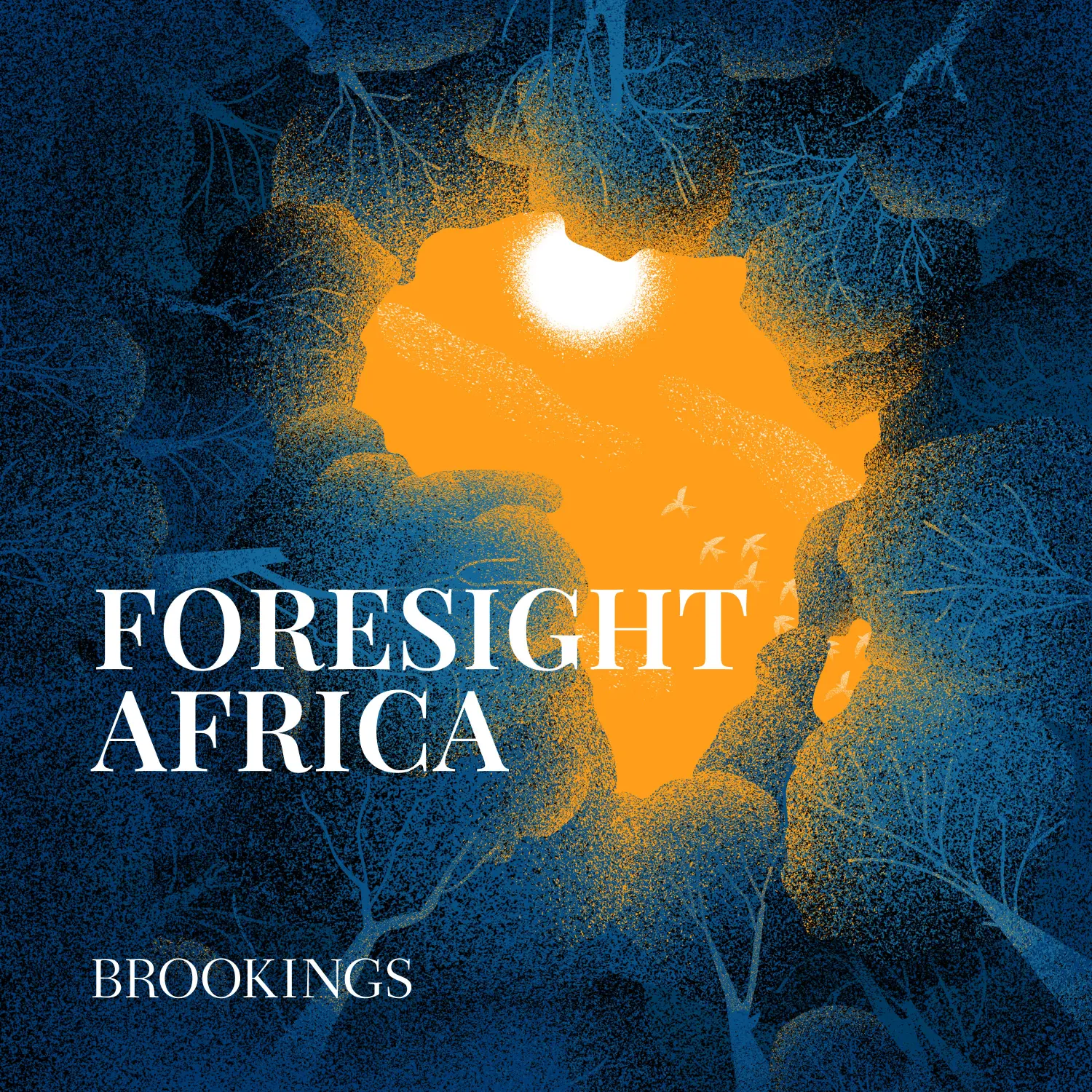
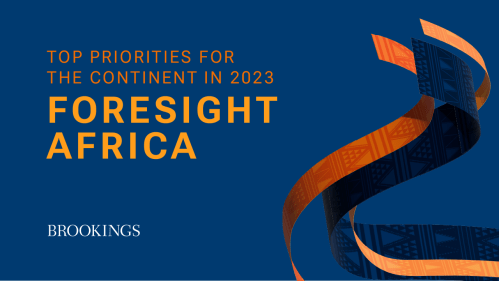
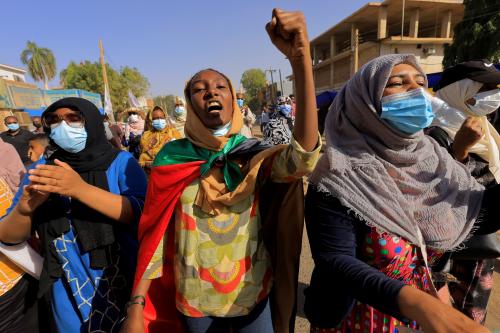
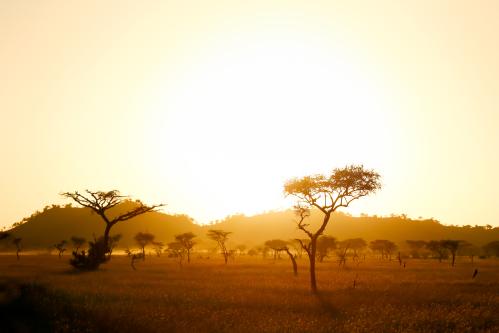
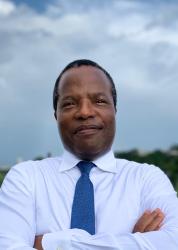



Commentary
PodcastSudanese women advancing justice and equality since the 1920s
February 1, 2023
Listen on
Foresight Africa Podcast